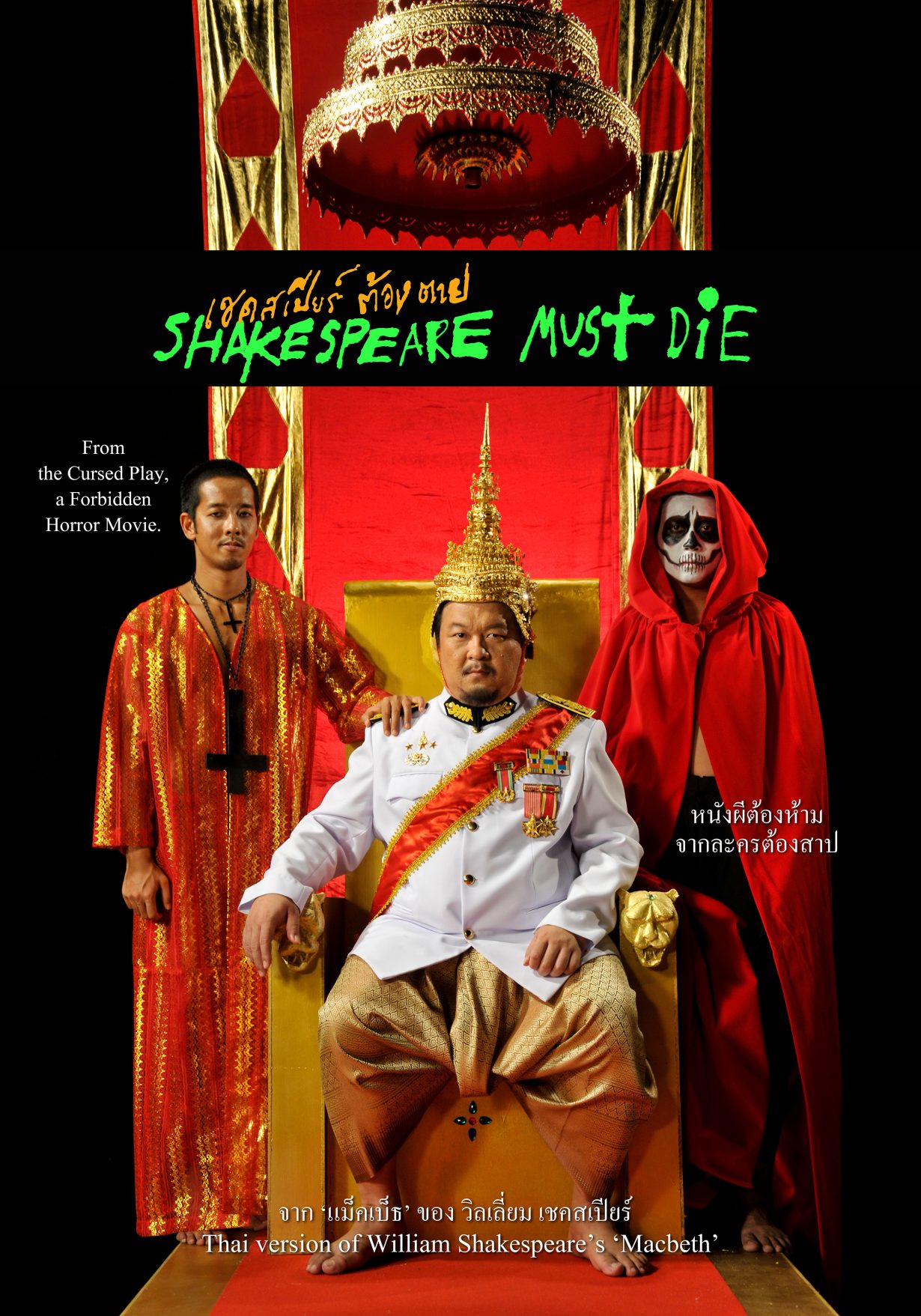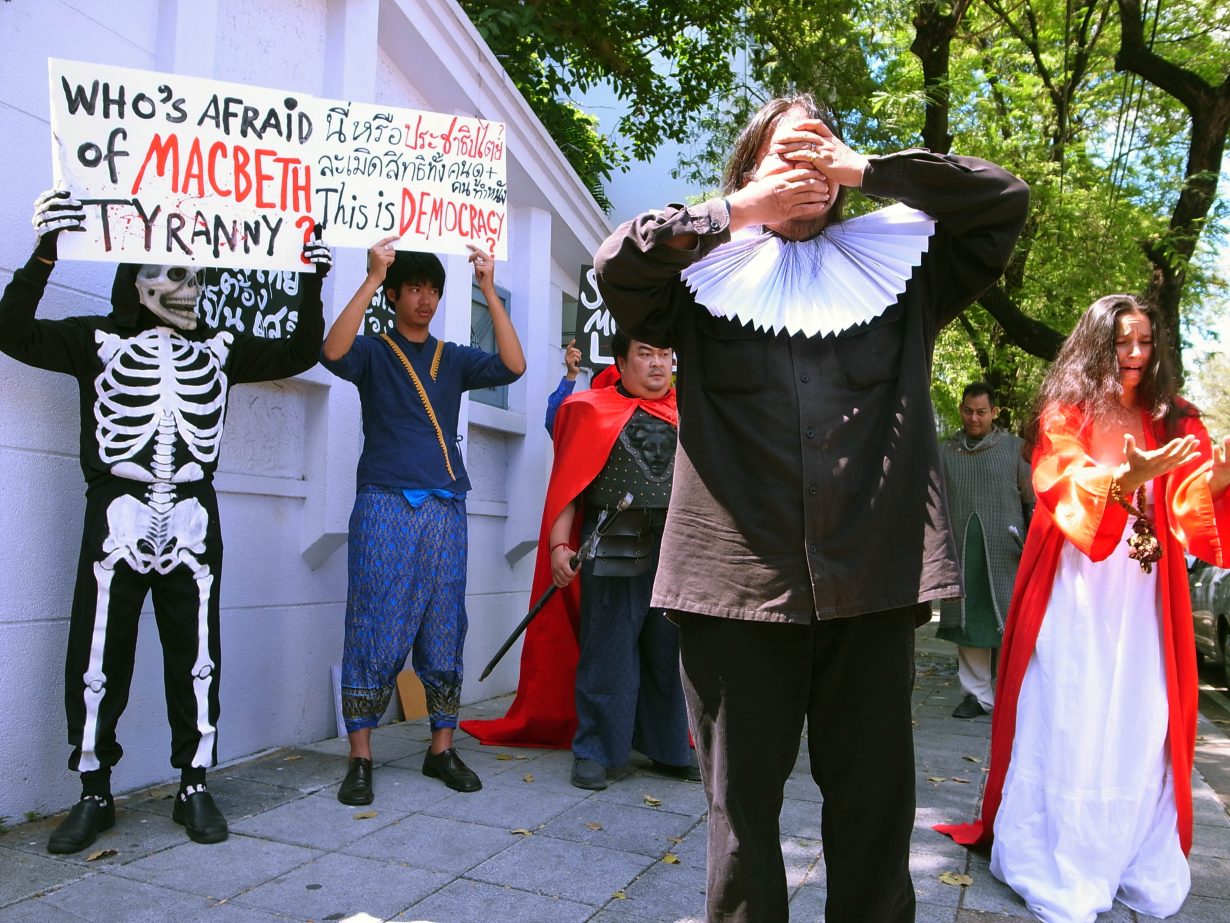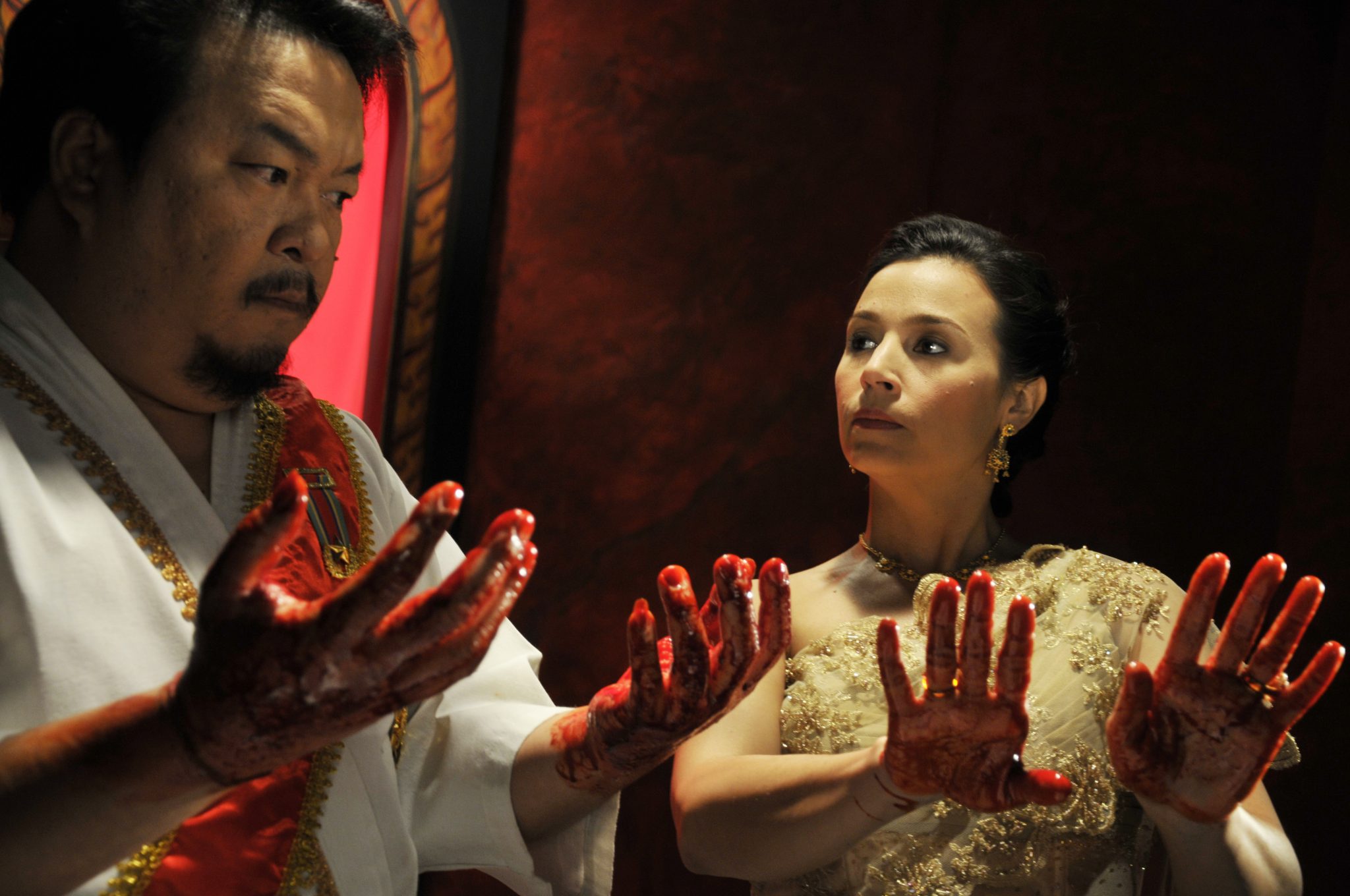There’s more than meets the eye in Shakespeare Must Die. Max Crosbie-Jones unpicks the saga of the Thai film in light of a longstanding ban being overturned this year
There’s a scene in Censor Must Die (2012), a documentary about film censorship in Thailand, in which an artist-filmmaker gets lost in the corridors of power. After passing through security, Manit Sriwanichpoom enters the vast atrium of Bangkok’s Chaeng Watthana Government Complex – a building that feels oppressive and dehumanising by design – and, after gazing around, hurries to make an appointment at the office of the National Human Rights Commission. “It’s like we’re inside a sci-fi movie,” he says, while catching his breath in a lift. “We’re disorientated, have lost our way in the system of big government.” The meeting goes ahead and Manit, after asking a member of the commission to investigate an abuse of state power committed against Thai cinema, exits the building. But now, 12 years on, he has only just emerged from the real bureaucratic maze at the heart of the documentary.
Earlier this year, a longstanding ban on the movie Shakespeare Must Die (2012), an adaption of William Shakespeare’s The Tragedie of Macbeth (1606), was overturned by Thailand’s Supreme Administrative Court. The movie oscillates between parallel versions of the original play: the staging of a minimalist theatre production, performed in period costumes, is being staged in a dictator-led country resembling modern-day Thailand. The court ruling essentially spelled out what Manit, its producer, and Ing Kanjanavanit, its director, had been arguing all along – that its content and script are ‘taken almost entirely from the original play’. And that while it does allude to an episode of political unrest in Thailand, this is, contrary to previous judgments, ‘unlikely to cause divisiveness and disunity among the people of the nation’. Manit and Ing’s relief upon being told that the 2012 ban was ‘a restriction of personal freedom’ (as the censorship board could have given the film a 20+ rating but opted not to), that financial damages had been awarded and that the film could finally be released was – and remains – intense. ‘This is a miracle,’ Ing recently told website Exotic Quixotic. ‘I was sure we would lose.’
The unshackling of their sly, intertextual take on Macbeth comes at a time when film industry reform is in the air. Since assuming power in August 2023, a coalition government led by the Pheu Thai Party has been touting creative-economy renewal under the populist banner of job creation and ‘soft power’. These proposals have coincided with some encouraging signals regarding censorship – an issue that dates to the beginnings of cinema in Thailand. ‘Pheu Thai and coalition parties are ready to support freedom of expression,’ said Paetongtarn Shinawatra, chairwoman of the National Committee on Soft Power Development, in January. ‘Only movies with content that may affect the monarchy will remain prohibited.’ Since then, the country’s film censorship committees have been pared down and revised, so that people from the private sector now outnumber bureaucrats. A nascent Thailand Creative Culture Agency is also spearheading a push to replace the country’s contentious 2008 Film and Video Act, which allows censors to demand cuts to films they deem ‘contrary to public order or good morals’ or that ‘may affect the security and dignity of Thailand’, or even to issue outright bans.

Meanwhile, after a recent run in local cinemas, Shakespeare Must Die is now screening at Cinema Oasis, a cinema in Bangkok owned by Ing and Manit, alongside another previously banned, but recently certified, film directed by Ing: Dog God: My Teacher Eats Biscuits (1997), a low-budget satire about organised religion, centred around the bacchanalian cult worship of a dog. There is a certain irony to this happening now, under a government helmed by Pheu Thai. It was under a previous Pheu Thai administration that Shakespeare Must Die was banned. Back then, however, between 2011 and 2014, the government slogan was ‘national reconciliation’, not ‘soft power’, and the film was deemed to be at odds with this woolly objective.
How the censors came to that conclusion is, in one sense, surprising: the vast majority of Shakespeare Must Die’s 172 minutes is a faithful retelling of a centuries-old play about regicide and its fallout, rendered in lilting, if coarse, Thai. A ‘supernatural soliciting’ by three witches leads to dripping daggers, hallucinatory ravings and Macbeth’s famous slide into delirium and madness. But in another sense their decision was not surprising at all: many of the play’s harrowing events take place in a country that looks like Thailand – a ferociously maintained constitutional monarchy with a king as head of state. Moreover, the film’s liberties with its source material and design choices are informed by the colour-coded politics that wracked the country during the early 2010s – a period when royalist Yellow Shirts stood on one side of the ideological divide, and the Pheu Thai-supporting Red Shirts on the other.
In particular, there is a scene towards the end when supporters of a fictional ‘dear leader’ with tyrannical aspirations and tendencies (played by Pisarn Pattanapeeradej, the same actor who plays the onstage Macbeth) burst into the theatre where the performance is taking place, drag the actors outside and proceed to cheer, smile and wave their clenched fists after a noose is fastened around a bloodied man’s neck. The event is reminiscent of the real-life massacre of 6 October 1976, when a police crackdown on leftist students at Bangkok’s Thammasat University led to some being lynched from trees. Ing is far from being the first filmmaker to invoke 6 October, but as she points out in Censor Must Die (which she also made with Manit), the fact that the rioters are wearing red headbands irked the censorship board.
Their reaction was also bound up with the paranoia and power plays that characterised the politics of the time. Shakespeare Must Die was one of over 50 film projects to receive culture ministry stimulus funding, between 2008 and 2011, from a coalition government affiliated with the Yellow Shirt movement led by then Prime Minister Abhisit Vejjajiva. A few years prior, a wave of street protests was initiated by the Yellow Shirts against Prime Minister Thaksin Shinawatra, whom they accused of harbouring republican aspirations and not showing adequate loyality to the monarchy (as well as corruption and abuse of power). This prompted the 2006 military coup d’état that led to his exile. But by the time the movie was finished, Thaksin’s sister, Yingluck Shinawatra, was prime minister, having won a decisive election victory as the leader of Pheu Thai: a reincarnation of Thaksin’s Thai Rak Thai party, and the political party around which the Red Shirts had mobilised.

Against this backdrop, Shakespeare Must Die’s political imagery – its red-cloaked Grim Reaper and diktat-issuing murderous dictator in a business suit, as well as its headbands – preyed on the censors’ priggish attitudes. As a member of the Thai senate says in Censor Must Die, “The manifest fact that’s been linked with the film and reason behind the ban is this: this country happens to have a king and this country has Thaksin.”
Ing Kanjanavanit’s recent claim that the film did not intend to make fun of or draw contrasts with anyone, but solely wanted
to help Thai audiences to ‘get into the pleasure of Shakespeare’ rings hollow. Her staunchly anti-Thaksin political leanings are also evidenced by Bangkok Joyride (2016), a four-part documentary about the Bangkok ‘Shutdown’ street protest movement of 2013–14. This was led by the People’s Democratic Reform Committee, which has been characterised as a successor to the royalist Yellow Shirts and was accused of helping to bring about yet another military coup – this time in May 2014, against the Yingluck administration. (While Thaksin has returned to Thailand, and his thirty-eight-year- old daughter, Paetongtarn Shinawatra, is the current prime minster, Yingluck remains in exile… for now.)
Still, if there’s a takeaway from the Shakespeare Must Die case, it’s that existing film policy leaves too much room for the caprice, squeamishness and biases of censors. Watching it today, when the Red Yellow rift has given way to a new strain of colour-coded politics (the Orange of the progressive Move Forward Party against a once unthinkable governing Red-Yellow coalition), it is far from being the incendiary propaganda film some made it out to be. Rather, it is a deftly constructed metadrama that, while tracing the rise and fall of megalomaniacs with treacherous political ambitions, also forewarns of creeping state censorship – the very forces to which it, until the court’s recent ruling, fell prey.
A proposed new film and videogames act might prevent such injustices from recurring. But with the lines concerning what is taboo in Thailand being redrawn (the Move Forward Party’s call to reform the lèse majesté law was recently ruled treasonous by Thailand’s constitutional court, leading to the party being dissolved), and with the arc of dynastic power in the country following its own devious, Shakespearean logic, don’t bet on it.
Shakespeare Must Die (2012) and Dog God: My Teacher Eats Biscuits (1997) are now playing at Cinema Oasis, Bangkok
